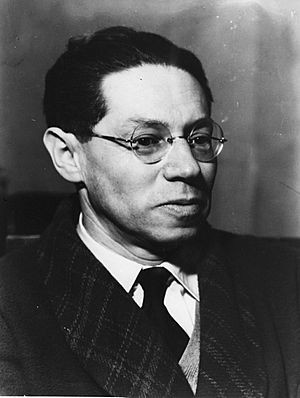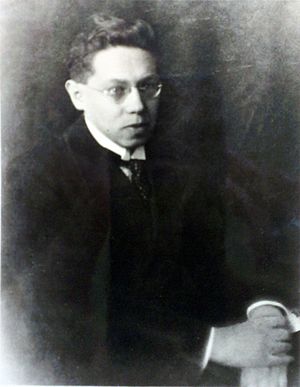Lion Feuchtwanger facts for kids
Quick facts for kids
Lion Feuchtwanger
|
|
|---|---|

Feuchtwanger in 1933
|
|
| Born | 7 July 1884 Munich |
| Died | 21 December 1958 (aged 74) Los Angeles |
| Occupation | Novelist, playwright, essayist |
| Notable works | Jud Süß (1925) The Oppermanns (1933) |
Lion Feuchtwanger (born July 7, 1884 – died December 21, 1958) was a famous German Jewish writer. He wrote many novels and plays. He was a very important person in the literary world of Germany before World War II. He even influenced other writers like Bertolt Brecht.
Because Feuchtwanger was Jewish and strongly criticized the Nazi Party, he became a target when Adolf Hitler became Germany's leader in 1933. After being held in a camp in France and making a difficult escape from Europe, he found safety in the United States. He lived there until he passed away in 1958.
Contents
Lion Feuchtwanger's Early Life
Family Background
Feuchtwanger's Jewish ancestors came from a city called Feuchtwangen in Germany. After a terrible event in 1555, all Jewish people were forced to leave that city. Some of them moved to Fürth, where they became known as "Feuchtwangers," meaning "those from Feuchtwangen." His grandfather, Elkan, moved to Munich in the mid-1800s.
Growing Up and Education
Lion Feuchtwanger was born in 1884. His father, Sigmund, made margarine and was an Orthodox Jewish man. Lion was the oldest of nine children. Two of his younger brothers, Martin and Ludwig Feuchtwanger, also became writers. Ludwig's son, Edgar Feuchtwanger, is a historian living in London. Two of Lion's sisters moved to Palestine when the Nazis came to power. One of his sisters sadly died during the Nazi era.
Feuchtwanger started writing when he was still in secondary school and even won an award. In 1903, he finished his high school exams at a top school in Munich. He then studied history, philosophy, and German language in Munich and Berlin. He earned his PhD in 1907.
Feuchtwanger's Writing Career
Starting as a Critic
After his studies, Feuchtwanger became a theater critic. In 1908, he started his own culture magazine called Der Spiegel. After a few months, his magazine joined with another one called Die Schaubühne, where Feuchtwanger continued to write. In 1912, he married Marta Loeffler.
When World War I began in 1914, Feuchtwanger served in the German military for a short time but was released due to health reasons. His experiences as a soldier influenced his later writings, which often had a left-wing viewpoint.
Working with Bertolt Brecht
Feuchtwanger quickly became well-known in the writing world. A young writer named Bertolt Brecht sought him out. They worked together on some of Brecht's early plays, like The Life of Edward II of England, around 1923–1924.
Becoming a Novelist
Feuchtwanger started writing historical novels after having some success with plays. His most famous novel was Jud Süß (meaning Jew Sweet), which he wrote between 1921 and 1922 and published in 1925. This book became very popular around the world. Another successful novel was The Ugly Duchess Margarete Maultasch. He moved to Berlin in 1925 and then to a large house in Grunewald in 1932.
In 1932, he published the first part of his Josephus trilogy, called The Jewish War.
Facing Nazi Persecution
Speaking Out Early
Feuchtwanger was one of the first writers to speak out against Adolf Hitler and the Nazi Party. He created works that warned people about them.
Exile from Germany
In 1930, Feuchtwanger published Erfolg (meaning Success). This novel was a fictional story about the rise and fall of the Nazi Party. The Nazis started to target him. While he was on a speaking tour in America, Hitler was appointed Chancellor of Germany on January 30, 1933. The German ambassador in Washington, D.C., advised Feuchtwanger not to return home.
In 1933, while Feuchtwanger was away, Nazi agents broke into his house. They stole or destroyed many valuable books and manuscripts from his large library. In the summer of 1933, his name appeared on a list of people whose German citizenship was taken away by the Nazis. During this time, he published his novel The Oppermanns. Feuchtwanger and his wife did not return to Germany. Instead, they moved to Southern France, settling in Sanary-sur-Mer. His books were among those burned by the Nazis on May 10, 1933.
The German government officially took away Feuchtwanger's citizenship in August 1933. Because he had warned about the Nazis' crimes even before they took power, Hitler saw him as a personal enemy. The Nazis even called Feuchtwanger the "Enemy of the state number one."
Feuchtwanger's writings showed the Nazis' racist policies years before other governments fully understood the danger. With his novels Success (1930) and The Oppermanns (1933), he became a leading voice against the Third Reich. The Oppermanns was quickly translated into many languages. In 1936, he wrote The Pretender, comparing a Roman impostor who claimed to be Emperor Nero to Hitler.
Imprisonment and Escape
When France declared war on Germany in 1939, Feuchtwanger was held in a camp for a few weeks. When the Germans invaded France in 1940, he was captured and imprisoned again. He was later smuggled out of the camp disguised as a woman. After months of waiting, he and his wife, Marta, managed to escape to the United States. They traveled through Spain and Portugal. They received help from people like Varian Fry, an American journalist, and Hiram Bingham IV, a US Vice Consul.
Marta Sharp, a Unitarian minister's wife, even gave up her own spot on a ship so Feuchtwanger could sail to New York City right away.
Life in the United States
Finding Safety
Feuchtwanger was granted political asylum in the United States. He settled in Los Angeles in 1941. That year, he published a book about his time in the internment camp, called The Devil in France.
In 1943, Feuchtwanger bought a house called Villa Aurora in Pacific Palisades, California. He continued to write there until his death in 1958. In 1944, he helped start a publishing company called Aurora-Verlag in New York City.
Views on the Soviet Union
Feuchtwanger was looking for a strong enemy of Nazi Germany. Because Western countries seemed to be trying to avoid conflict with Hitler, Feuchtwanger became interested in Soviet communism.
From 1936 to 1937, he visited the Soviet Union. In his book Moskau 1937, he wrote positively about life there. This caused some debate among his friends. His positive views on the Soviet Union later made it harder for him to become a US citizen.
Later Years and Death
During the McCarthy era in the US, Feuchtwanger was viewed with suspicion because of his past positive writings about the Soviet Union. In 1947, he wrote a play about the Salem Witch Trials called Delusion, or The Devil in Boston.
Towards the end of his life, Feuchtwanger wrote more about Jewish themes, such as The Jewess of Toledo. He also supported the State of Israel as a safe place for Jewish people.
In 1953, Feuchtwanger received an award for art and literature from East Germany.
Lion Feuchtwanger became ill with stomach cancer in 1957. He passed away in late 1958. His wife, Marta, continued to live in their house and dedicated her life to preserving her husband's work. Before she died in 1987, Marta Feuchtwanger donated her husband's papers, photos, and personal library to the Feuchtwanger Memorial Library at the University of Southern California.
Important Books by Feuchtwanger
Jud Süß
Feuchtwanger became very well known in Germany in 1925 when his novel Jud Süß was published. The story was about a historical figure named Joseph Süß Oppenheimer. Feuchtwanger wanted to show the sadness caused by human weaknesses like greed and pride, not to be against Jewish people.
At first, major publishers didn't want the novel, but a smaller one took it on. The book became incredibly popular, selling many copies and being translated into 17 languages by 1931. This success made Feuchtwanger a major German author and gave him financial freedom.
His novel was made into a movie in Britain in 1934, which showed the character in a good light. However, the Nazi party in Germany later made their own anti-Jewish version of the film in 1940, which showed Oppenheimer as an evil person.
The Oppermanns
When Hitler became Chancellor in January 1933, Feuchtwanger wrote The Oppermanns. This book described the changes happening in Germany. It was released the same year and quickly became popular, translated into over 10 languages.
Many people praised the novel for showing how German society changed under Nazism. It is still seen as one of the most important books about the downfall of democracy in Germany. While Feuchtwanger's popularity in English-speaking countries has decreased since the 1950s, he remains well-known in German-speaking countries.
Other Notable Books
- The Ugly Duchess (1923)
- The Life of Edward II of England (1924): written with Bertolt Brecht.
- PEP: J.L. Wetcheek's American Song Book (1928)
- The Waiting Room Trilogy:
- Success: Three Years in the Life of a Province (1930)
- The Oppermanns (1933)
- Exil (Paris Gazette) (1940)
- The Josephus Trilogy (about Flavius Josephus):
- Josephus (1932)
- The Jew of Rome (1935)
- Josephus and the Emperor (1942)
- Little Tales (1934)
- The Pretender (1936)
- Moskau 1937 (1937)
- The Devil in France (1941)
- Double, Double, Toil and Trouble (1943)
- Simone (1944)
- Faithful Peter (1946)
- Foxes in the Vineyard (1947/48) - about Pierre Beaumarchais and Benjamin Franklin.
- The Devil in Boston: A Play about the Salem Witchcraft Trials (1948)
- Odysseus and the Swine, and Other Stories (1949)
- Goya (1951) - a novel about the famous painter Francisco Goya.
- Tis folly to be wise, or, Death and transfiguration of Jean-Jaques Rousseau (1952)
- Raquel, The Jewess of Toledo (1955)
- Jephthah and his Daughter (1957)
Awards
- 1957: National Jewish Book Award for Raquel: The Jewess of Toledo
Images for kids
See also
 In Spanish: Lion Feuchtwanger para niños
In Spanish: Lion Feuchtwanger para niños
- Exilliteratur



